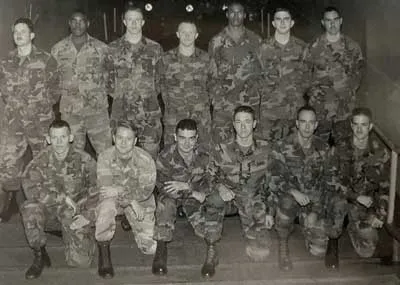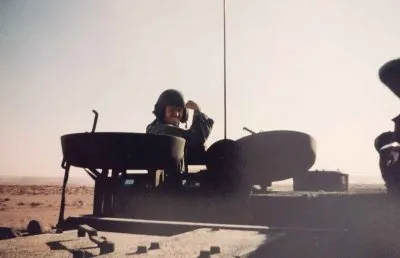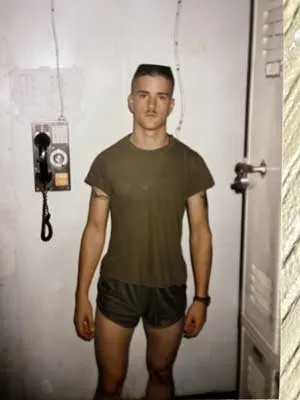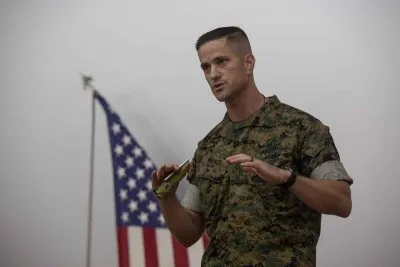I Had the Best Squad Leader in the Marine Corps. He Showed Us Kindness Is Not Weakness.
I served as an infantryman in the Marine Corps for 25 years, reaching the rank of master gunnery sergeant. I deployed seven times, including three tours in Iraq, and served five years overseas. I received numerous awards and decorations, including a Purple Heart and Combat Action Ribbon. I’m not broadcasting these achievements out of any bravado or self-aggrandizement but to establish a position of credibility for the bold statement that follows: I had the best squad leader in the Marine Corps.
In the mid-1990s, I checked into my first unit as an 18-year-old private first class. Half the guys in the unit had already served two years and deployed—and they let me know it, referring to me as “Hey Boot!” in a condescending tone that did not evoke an atmosphere of mentorship.

Adam Walker (front row, far right) joined the Marines as an 18-year-old and quickly regretted his decision. Then he met Sgt. Davis (back row, center)—the best squad leader in the Marine Corps. Photo courtesy of the author.
I had no car, no television, no cell phone—few did back then—and had not yet made friends. I missed my girlfriend. Maybe, I thought, joining the Marines was a bad decision. I considered going on unauthorized absence and becoming a deserter. A small measure of discipline and pride kept me from taking that irrational step.
As the boot, I did all the menial tasks. I expected as much, but the method left me demoralized. The corporals—or senior lance corporals—banged on my hatch at 0600 on the weekends: “Hey Boot! Go clean the laundry room!”
During a police call, a noncommissioned officer yelled, “Hey Boot! You missed that cigarette butt. Attention to detail! I guess you’re just gonna walk past a trip wire and get the rest of the platoon killed. You suck!”
On my first field operation, I shivered through the night in my wooly pully (wool sweater) and gumby suit (rubber rain suit) in a ditch half-full of water. I awoke to a lance corporal hitting me in the face with an MRE. “Pack it up, Boot! We’re stepping off in 10.”
Sometimes, the command “Push Boot!” accompanied these verbal admonitions, short for drop and give me pushups. I knew I wasn’t a screw-up, that I was in excellent shape. I kept my room clean and my uniform squared away. Yet no matter how well I performed, I was scorned.
They had been boots a year and a half earlier. Some were noncommissioned officers; others would never become noncommissioned officers. I had no choice but to respond, “Aye, corporal!”
Then one day, a new squad leader checked in—a sergeant whose rank in the infantry indicated he’d served longer than four years. I braced myself for another bitter and condescending noncommissioned officer.

Sgt. Davis—“the best squad leader in the Marine Corps”—in an AAV during a field operation in 1995. Photo courtesy of the author.
Instead, Sgt. Davis walked in, physically fit and in a flawless uniform. He sported a red flattop and a huge smile. “How you doing, stud?”
At that moment, I considered the possibility that I was more than just “Hey Boot.” He’s right, I thought. I am a stud.
Sgt. Davis, I learned, was a Texas native who’d served in an infantry battalion in Hawaii and at embassies in Moscow and Caracas as a Marine security guard. He didn’t flaunt his rank or experience. He exuded confidence and competence. He had a cheerful disposition and never talked down to us. To him, we were “Warrior,” “Stud,” “Killer.” I got the impression Sgt. Davis believed it was a privilege to serve as a squad leader. I wanted to be like him.
Award-Winning Journalism in Your Inbox
After a six-month work-up, we deployed aboard a ship for six months. Throughout that time, Sgt. Davis counseled me not just as a Marine, but as a young adult. I carried the lessons he taught by example when I became a squad leader and, later, a platoon sergeant.
Sgt. Davis showed me that kindness is not a weakness. That those who berate, demean, and condescend may see obedience while supervising but will not inspire loyalty among those they lead. I never addressed a Marine as “Boot” or allowed subordinate leaders to, either. Instead, I challenged those in the habit of it to substitute “Brother” for “Boot” and to take note of the impact in their unit.
Some leaders are angry all the time and communicate by yelling. Sgt. Davis showed me that you can be fierce, direct, and harsh, but only in situations that warrant it. Otherwise, it’s best to maintain an even disposition and a pleasant manner. Only when necessary put your Marines on “blast,” and they’ll respond with urgency and remember the correction.
As a young grunt, I intermittently used smokeless tobacco. One day I let out a large stream of tobacco spit at the end of a platoon formation. Sgt. Davis immediately thrust a knife hand in my face. “If you ever come to formation with a dip in again I’ll make you eat a whole can! Do you understand me?”
“Yes, Sergeant,” I replied.
“We don’t do that in First Squad. You’re better than that,” he said.
It was embarrassing to get chewed out publicly, but by then I was more disappointed in myself for not meeting Sgt. Davis’ expectations. I never did it again.

Adam Walker as a lance corporal on ship in 1995. Photo courtesy of the author.
Some of Sgt. Davis’ friends—his peers—called him “Red Dog.” One day while digging a fighting hole in the field, Sgt. Davis told me to go get a case of chow. I still had a lot of digging to do.
“Send Roth,” I said, referring to my roommate.
“No.”
“I was on the last working party last time. Come on,” I persisted.
Sgt. Davis was still smiling. “I’m sending you. Now get moving.”
“Come on, Red Dog,” I complained.
Sgt. Davis’ smile vanished then. “Push.”
I immediately dropped to the ground and started doing pushups. Understanding human nature, my youth, and a Marine’s tendency to gripe, Sgt. Davis tolerated a little backtalk. But I went too far.
“Now get your ass over there and grab that case of chow.”
Sgt. Davis was friendly, but he was my squad leader. He showed me that I should never forget that he was in charge—and I didn’t after that.
Sgt. Davis taught me that you must be good at your job and good at being a Marine. Some focus on one or the other. There’s no value in complaining about an assignment. Execute orders and do them well. Always leave a place better than you found it. Be the kind of Marine others want to follow.
He taught me that in the Marine Corps and the infantry, you gotta do hard things. You must be tough physically, mentally, and emotionally. You must lead your Marines through their hesitancy to do the hard things. A 19-year-old may be physically tough but not yet emotionally mature enough to handle everything they encounter. Good leadership will prevail in those hard times, and then a Marine will develop the resiliency to face them.
Each month I served under Sgt. Davis, we conducted a battalion formation that stretched almost a half-mile. Each company had a guidon. We sang cadence, yelling at the top of our lungs. Occasionally in an act of bravado, a Marine ran to the front of their company, took the guidon, and ran around the entire battalion.
One day, Sgt. Davis looked at me and yelled, “Go for it, stud!”
I bolted from formation yelling, “Oorah!”

Adam Walker as a master gunnery sergeant at the end of his career, teaching the lessons he learned from Sgt. Davis. Photo courtesy of the author.
Holding the guidon high, I ran toward the front of the battalion, where the sergeant major yelled, “Get some, Echo!” Once I reached the end of the formation, I rounded the tail and looked forward. Echo Company was way up there. My outward enthusiasm began to diminish. I had no option, though. I had to complete the task. I made it back with burning lungs and resumed my place in formation.
Then: “Lance Cpl. Walker, won’t you come out, we wanna hear you scream and shout!”
I had serious doubts after that lengthy sprint. My face had a look of surprise, hesitation, and dread. I glanced up to Sgt. Davis with an amused grin. His face turned serious with a look that said, Get out there!
“I got it! Lo-righta Lay-o!” I screamed loudly. I led the cadence for a turn, then called out the next guy. Exhausted but not defeated, I returned to formation and fell into pace. Sgt. Davis looked back at me with an approving smile. He had challenged me publicly. If I had failed, my reputation would have plummeted. Conversely, by pulling it off well I stood out. Words cannot convey how much I valued his approval.
Our Journalism Depends on Your Support
Sgt. Davis reminded me that Marines are part of something greater than themselves and that we are not alone.
Thank you, Sgt. Davis. You impacted more than just the Marines you encountered along the way. I took the lessons you taught, lived them, and taught them to others. Your legacy lives on.
So, I say again: I had the best squad leader in the Marine Corps.





Comments are closed.